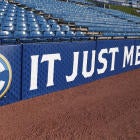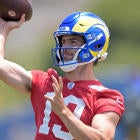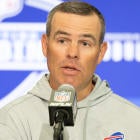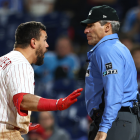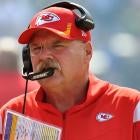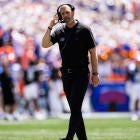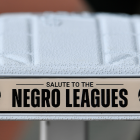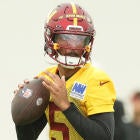 |
| Pitt defensive end Hugh Green finished second in the Heisman vote in 1980. (US Presswire) |
Pittsburgh's Hugh Green is one of the greatest defensive players in college football history.
Though undersized for a defensive end at 6 feet 2, 220 pounds, Green dominated during his four years at Pitt. In his first game as a 1977 freshman, he had 11 tackles, a blocked punt and two sacks againt eventual national champion Notre Dame. By his senior season, he was an absolute terror, totaling 123 tackles, 17 sacks, four fumble recoveries and six pass breakups.
In that 1980 senior campaign, Green finished a strong second in the Heisman vote to South Carolina running back George Rogers. It's the best finish ever by a pure defender in Heisman history.
I caught up with Green, a native of Natchez, Miss., over the phone on Thursday and talked with him about his Heisman experience, his playing days and what he thinks of Notre Dame linebacker Manti Te'o's run at the trophy:
Did you have any Heisman expectations heading into that senior year?
"Yes, very much so, because of the year we had the previous season. We had started campaigning in the summer leading up into it. During that period of time in college football, the focus had shifted more toward defense. The dominant players coming out back then were all defensive players -- guys like Kenny Easley and Ronnie Lott. So those kinds of players were getting a lot of attention. But there were some timing issues that year for us that affected things. We played Penn State after the Heisman vote was due and that was one of the large problems I had to overcome."
As the season went on, did you think you had a chance?
"I knew I had a chance because of the type of year I had and the year that our team had. My wish back then was that we'd get a chance to play against some the individuals I was in competition with. They made the selection and I still had a game to play, so that was a bad omen."
Was there a lot of pressure on you to perform week in and week out to keep pace with your Heisman competition or were you just out there having fun?
"We were just having fun. We were the No. 1 defense in the country. I felt very good about it. The way we played defense, it was fun. They weren't as adept as they are now about hyping the Heisman race."
What did opposing teams do to minimize your impact?
"They did all kinds of stuff. Our coordinator who was Foge Fazio and we had been together all those years -- Jimmy Johnson was my defensive coordinator when I was a freshman and sophomore. We designed all kinds of schemes where we'd put me where teams couldn't account for me. I had one key ingredient, though, and that was I had a guy on the other side of me named Ricky Jackson who was a very good and impressive player. That minimized what teams could do. They had a choice, either run to me or run to Ricky and they chose Ricky."
How did you find out that you didn't win the Heisman?
"Our PR department kept us up on what was happening. It wasn't like today where they take the top three or four players and take you to New York. My inkling was that I could win because I had basically won every major trophy in the country. I had scooped up everything. I was the AP and UPI player of the year. But the more I learned about the history of the award and who they catered to, the thinking about it became more evident. Again, defenses were dominant at that time. Players would go into a game and totally control it. But people back then didn't know or have the capability of thinking about defensive players controlling the game. They've matured and grown into it now, I think."
Has there been any defensive player since you played who you thought should've won the Heisman? What do you look for when it comes to defensive stats?
"One who comes to mind is Ndamukong Suh. He was dominant and controlling and constantly beating double teams.
"Everybody loves the sack monsters, the guys who make interceptions. I look for a player who changes the offensive game plan. It's like when they put eight in the box to stop a running back or quarterback."
Do you want just any defensive player to eventually win the Heisman or do you want him to be a guy who is better than you were?
"I would like a guy to be better than me. I want him to be a complete player, someone who understands the game, who studies well, who knows tendecncies and dictates the game. If a defensive player dictates not just one game, but every game, then that creates the scenario where he has a chance to win. It's just like with an offensive player who dictates the game. All the rules have changed now to make it more productive for offenses. Defenses keep catching up and then they have to switch again. With all these shotguns and triple options, I don't know if any current defensive player has put himself in position to be a player who can dictate the game.
Do you think it's going to take an out-of-this-world statistical year for a defender to win it, or do you think it'll just happen because of a fluke?
"I think it's going to happen by fluke. Right now the Heisman winner is the guy who has the best year, not who has the best career. That's the difference from before. The voters recognize that one year now whereas when I was around it was all about showing consistency and being recognized for that. Back then, you had the Bob Hope All-American Show, the AP All-Americans, the Walter Camp team and I could depend on seeing those exact individuals who had had a great year showing up the next year."
It's been a while since I've thought about the Bob Hope All-American Show. What was it like to take part in it?
Dealing with Mr. Hope was a complete pleasure. Especially after you came there more than once. A lot of people thought he was inept, but he was sharp. He knew things that you didn't think he knew, which meant he watched you play. We'd do a skit and if it got messed up, Mr. Hope would do a completely different comment or joke off the cuff. He was the cream of the crop."
Do any current players remind you of you?
When you go out and talk about comparing between then and now, it's a totally different thing. I see guys go to camp now and two or three days in, they pull a hamstring. I immediately think that the guy did nothing during the summer time, which shows the lack of seriousness to his game. And technique-wise you have bigger guys who are better athletes than back then, guys who are 6-foot-6 and 250 pounds who run a 4.3. There are guys who are flat out athletes who just run to the ball. With us, it was about mastering the game. It was an art. That's the separation from then and now. A lot of guys are pure athletes but don't have any knowledge of the game. That disappoints me. I want to see a guy who is a master of the game, who knows how to set a tackle up, who knows what to do and knows what the offense is doing to him.
What do you think of Manti Te'o?
"I think he's an incredible athlete. He's the ringleader of a great defense. Everything he does, such as how he makes his checks makes me think he really understands the game, and that he studies film and his opponents a lot. That's very rare. Still, I would've liked to have seen him have that same kind of productivity his junior, sophomore and freshman years."
Does he deserve the Heisman?
"I think he controls the game. I think he's worthy. We'll see if the scenario works out. I wish Te'o could be in a different situation because people really don't recognize defenders and their talents enough. If they did, I think he would win the Heisman."
What do you think of Jadeveon Clowney? If Te'o doesn't win, do you think he has a chance next year?
"I like that kid. I like his motor. It's very fast. He has some help on his defense. They'll put him in position to continue his success and it's good that he's at South Caolina and in the SEC, which has been branded as the best conference. I feel if he has the type of year next year that he's been having this year, I'd think he'd be in line to do what we've talked about and could convince people that an outright defensive player deserves it."
Do you think the Hugh Green of 1980 could play today?
"I could play the same role but it would have to be under a very smart, aggressive defensive coordinator who knew what he had. I was a technician. I was smarter than I looked. I knew how to play blocks. I could walk into a defense and not know the scheme and still be able to play the run. That was because of being a technician and knowing the fundamentals of foootball."
Did you go to Pitt because of that 1976 national title?
"Yeah. A lot of teams thought the SEC would have everything wrapped up with me. I recently talked to Barry Switzer and he asked if he recruited me and I told him he didn't. Everyone thought i was too small. But our scheme of defense changed everyone's mind. It doesn't make a difference what size you are, it's what's inside of you. But if I hadn't gone to Pitt, I had put in my mind that I would stay in state of Mississippi. I would've gone to Mississippi State."











